The world of application deposits in Virginia can be a complex and daunting one, especially for those who are new to the rental market. As a landlord or property manager, it's essential to understand the rules and regulations surrounding application deposits to avoid any potential pitfalls. In this article, we'll break down the top 5 rules for application deposits in Virginia, so you can ensure you're in compliance with state laws and regulations.
The Importance of Understanding Application Deposits
Application deposits are a crucial part of the rental process, and it's essential to understand the rules surrounding them. Not only do application deposits help landlords and property managers cover the costs associated with processing rental applications, but they also serve as a safeguard against potential tenants who may not be serious about renting the property. By understanding the rules for application deposits in Virginia, you can avoid any potential disputes or issues down the line.
Rule #1: Disclosure is Key
In Virginia, landlords and property managers are required to disclose the terms and conditions of the application deposit to potential tenants. This includes the amount of the deposit, the purpose of the deposit, and how the deposit will be used. It's essential to provide this information in writing, and to ensure that potential tenants understand the terms and conditions before submitting their application.

Best Practice: Include Disclosure in the Rental Application
To ensure compliance with Virginia law, it's best practice to include the disclosure in the rental application itself. This can be done by adding a section to the application that outlines the terms and conditions of the application deposit. By including this information in the application, you can ensure that potential tenants understand the terms and conditions before submitting their application.
Rule #2: The Application Deposit Must be Refundable
In Virginia, application deposits must be refundable if the landlord or property manager fails to approve the tenant's application. This means that if the tenant is not approved for the rental property, the application deposit must be refunded in full. It's essential to understand that the application deposit is not a fee, and it must be refunded if the tenant is not approved.

Best Practice: Provide a Refund Policy
To ensure compliance with Virginia law, it's best practice to provide a refund policy that outlines the terms and conditions of the application deposit. This can be done by adding a section to the rental application that outlines the refund policy. By providing a clear refund policy, you can ensure that potential tenants understand the terms and conditions of the application deposit.
Rule #3: The Application Deposit Must be Used for a Specific Purpose
In Virginia, the application deposit must be used for a specific purpose, such as to cover the costs associated with processing the rental application. The application deposit cannot be used for any other purpose, such as to pay for damages or unpaid rent. It's essential to understand that the application deposit is not a security deposit, and it must be used for the specific purpose outlined in the rental application.

Best Practice: Outline the Specific Purpose in the Rental Application
To ensure compliance with Virginia law, it's best practice to outline the specific purpose of the application deposit in the rental application. This can be done by adding a section to the application that outlines the specific purpose of the deposit. By providing a clear outline of the specific purpose, you can ensure that potential tenants understand how the deposit will be used.
Rule #4: The Application Deposit Must be Held in a Separate Account
In Virginia, the application deposit must be held in a separate account, such as an escrow account. This means that the application deposit cannot be commingled with other funds, such as the landlord's personal funds. It's essential to understand that the application deposit must be held in a separate account to ensure that it is protected and can be refunded if necessary.

Best Practice: Use an Escrow Account
To ensure compliance with Virginia law, it's best practice to use an escrow account to hold the application deposit. An escrow account is a separate account that is specifically designed to hold funds until they are disbursed. By using an escrow account, you can ensure that the application deposit is protected and can be refunded if necessary.
Rule #5: The Application Deposit Must be Refunded Within a Certain Timeframe
In Virginia, the application deposit must be refunded within a certain timeframe, typically within 20 days of the tenant's application being approved or denied. It's essential to understand that the application deposit must be refunded within this timeframe to avoid any potential disputes or issues.

Best Practice: Provide a Refund Timeline
To ensure compliance with Virginia law, it's best practice to provide a refund timeline that outlines when the application deposit will be refunded. This can be done by adding a section to the rental application that outlines the refund timeline. By providing a clear refund timeline, you can ensure that potential tenants understand when they can expect their application deposit to be refunded.
Gallery of Related Keywords:





FAQ Section:
What is an application deposit?
+An application deposit is a payment made by a potential tenant to cover the costs associated with processing their rental application.
Is an application deposit refundable?
+How long does a landlord have to refund an application deposit?
+A landlord typically has 20 days to refund an application deposit after the tenant's application has been approved or denied.
By following these 5 rules for application deposits in Virginia, you can ensure that you are in compliance with state laws and regulations. Remember to disclose the terms and conditions of the application deposit, hold the deposit in a separate account, and refund the deposit within a certain timeframe. By following these best practices, you can avoid any potential disputes or issues and ensure a smooth rental process for both landlords and tenants.
